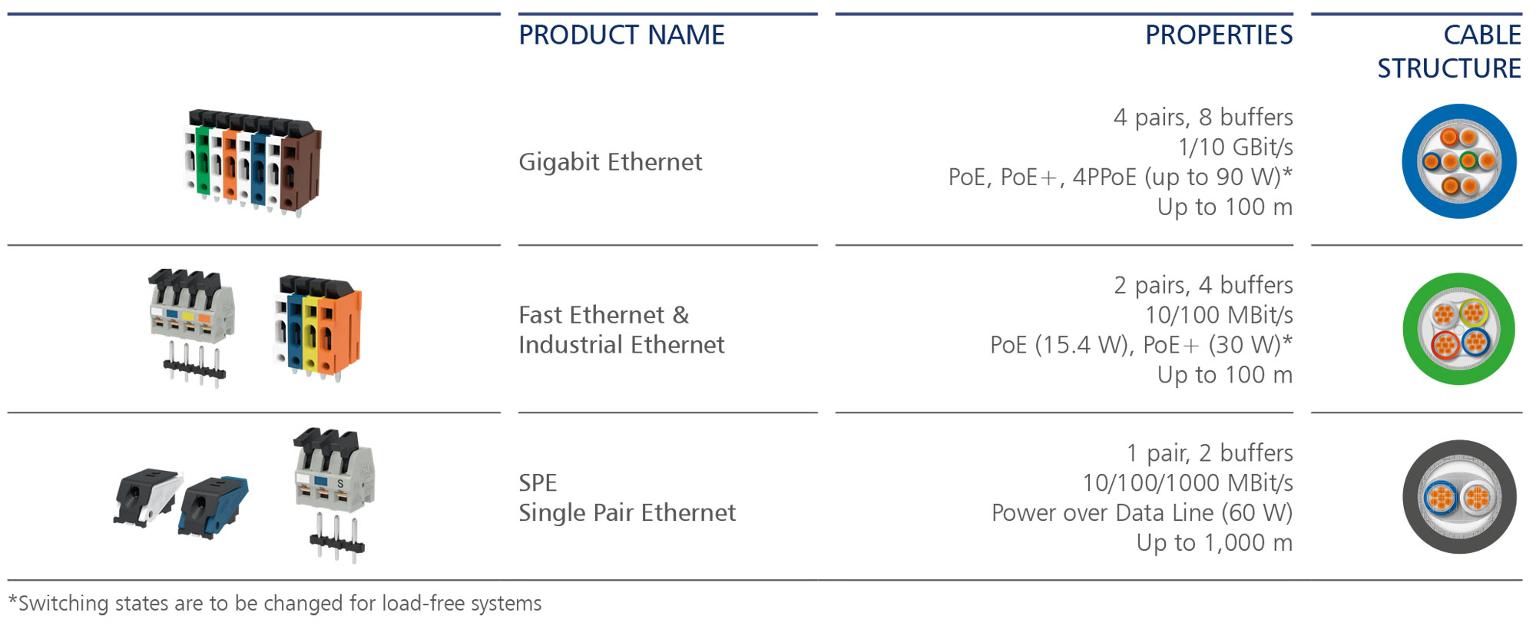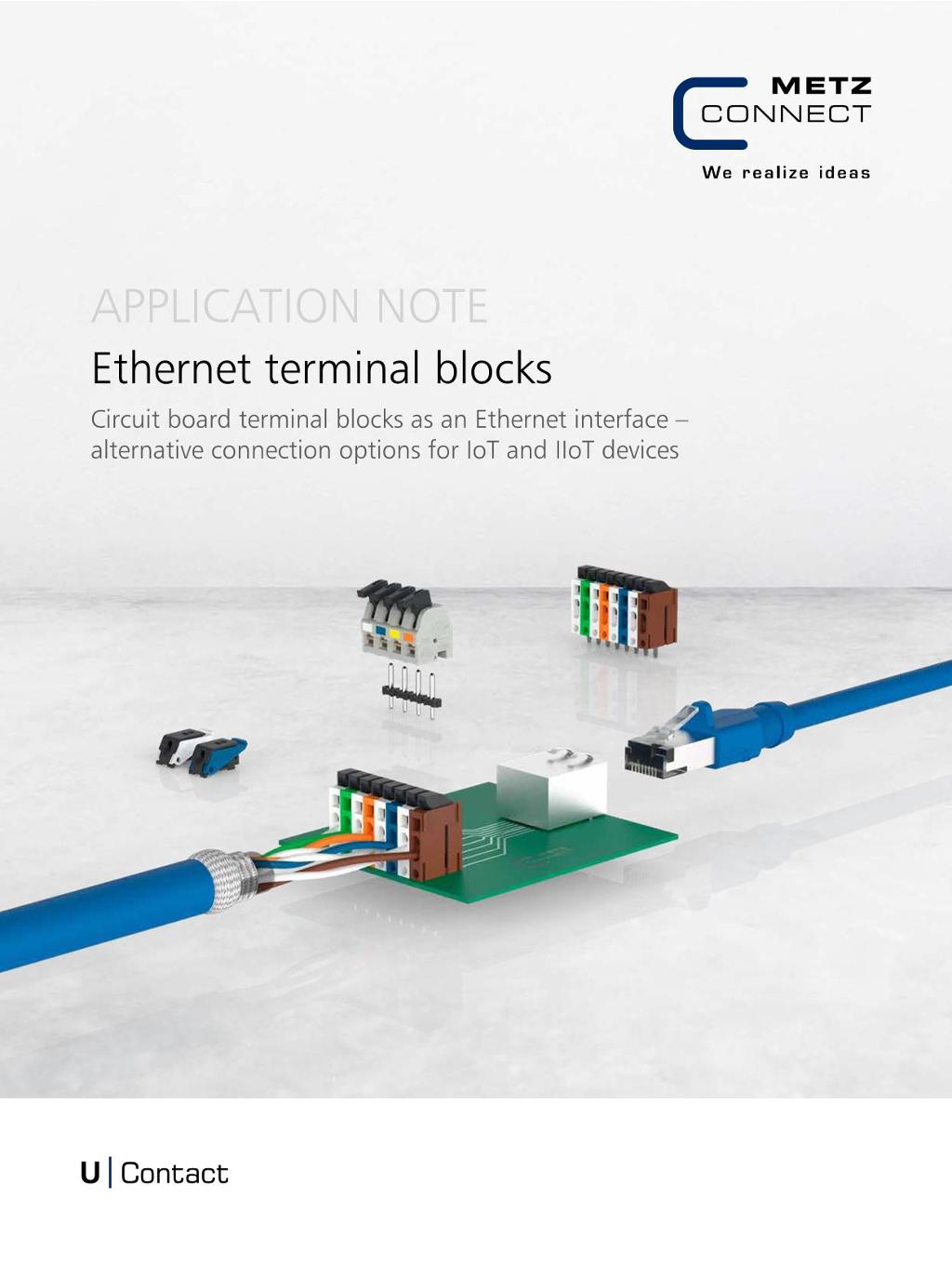Ethernet terminal blocks
Circuit board terminal blocks as an Ethernet interface – alternative connection options for IoT and IIoT devices

Internet of Things, abbreviated IoT, is the main term for constant change. The term encompasses the omnipresent digitalization and networking of every conceivable “thing”" device, sensor, machine, vehicle, service, person, and more. With a view to industry, we also refer to the IIoT - the Industrial Internet of Things. Behind this is the digitalization of products, production methods and processes, on the basis of which Industry 4.0 is developing. In this world, all objects in industry are networked. People, machines and even products communicate with each other.
With the growth of fiber glass, 5G and WLAN transmission media, the question arises about the future of twisted-pair network cabling. One benefit is that the further development of Ethernet transmission technology and PoE power supply with currently up to 90 W also creates new applications with an Ethernet interface. In addition, an increase need for standardized, lean transmission technology is developing, both in respect of the transmission protocol, as in respect of hardware, connectors and cabling. Ideally, the standardized transmission technology extends directly to the sensors and actuators at the field level. This should be made possible in the future withSingle Pair Ethernet (SPE).
Ethernet terminal block solutions
In principle, corresponding mechanical requirements, data transfer rates and power supply are needed for different applications. In the case of connectors, the choice depends on the application and requirements, for example between RJ45, M12, M8 or SPE, with IP20 or IP67 protection, and one, two or four pairs. Similar to connectors, it makes sense to select the terminal block according to the requirements. Since the terminal blocks are installed on or in the device, the focus is less on IP protection and more on the data transfer rate, connection method, connection type, grid dimension or size.

Advantages of PCB terminal blocks
There is already an increasing demand for terminal blocks as an interface for any Ethernet application, be it for Gigabit-enabled devices, Industrial Ethernet, Single Pair Ethernet, or Advanced Physical Layer (APL).
- Easy handling, color coding
- Assembly-friendly, without special tools
- Pluggable or permanently soldered
- Broad cover of cable cross-sections
- Different designs
- Ideal for compact devices with tight space conditions
- Cost-effective solutions
Fewer components
Data transfer properties for up to 10 GBit/s Ethernet
Single, double or four-pair Ethernet
PoE, PoE+, 4PPoE, PoDL and more*
Hybrid system for Ethernet and power supply possible
SPE ready for up to 1.000 m
*Switching states are to be changed for load-free systems
Application options
Need for Ethernet terminal blocks
Terminal blocks instead of connectors are of interest for devices that are permanently installed and do not need a plug/ removable connection, do not need a maintenance interface and which typically are installed permanently in one location. For example sensors, lights, etc. Circuit board terminal blocks are and increasingly will be a beneficial alternative to the standard Ethernet connectors and connection technologies.
Driving topics
General growth in IoT/ IIoT devices with Ethernet interface
Permanently installed devices that usually do not have to be plugged in, e.g. static devices, sensors, etc.
Transfer-related benefits
1 MBit/s up to 10 GBit/s
Power over Ethernet/Power over Dataline
Technical benefits
Wide range of buffer cross-sections
Various designs for different applications
- Single Pair Ethernet
- Networking of the field level in industry, process and building automation
- Many compact terminal devices
- Long distances up to 1,000 m with cable cross-sections up to AWG 16
- 4-pair Ethernet infrastructure
- Miniaturization
- Building automation




